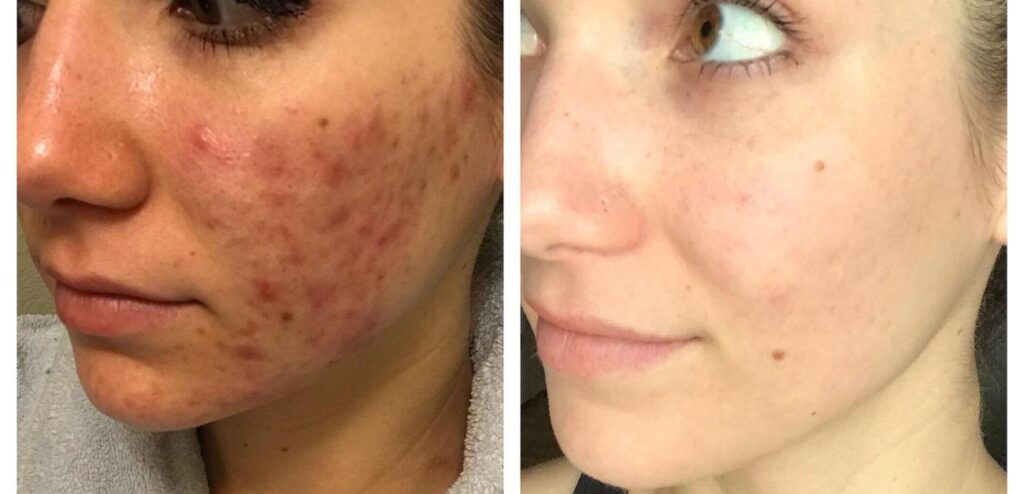Acne is one of the most common skin conditions worldwide, affecting people of all ages, particularly teenagers and young adults. While acne is often associated with excess oil, clogged pores, and inflammation, finding effective natural remedies for managing the condition is something many people seek. Apple oil, extracted from apple seeds, has recently gained attention for its potential benefits in skincare, including its ability to manage acne. In this article, we’ll explore whether apple oil can help with acne and how its properties may contribute to clearer, healthier skin.
1. What is Apple Oil?
Apple oil is a natural oil derived from the seeds of apples, typically through cold-press extraction. It is rich in essential fatty acids, vitamins, antioxidants, and other beneficial compounds like polyphenols. These nutrients contribute to its many skin benefits, including moisturizing, soothing inflammation, and protecting the skin from oxidative stress. While apple oil is known for its hydrating properties, it also holds promise in addressing various skin concerns, including acne.
2. How Apple Oil Benefits Acne-Prone Skin
Apple oil contains a combination of ingredients that can address some of the underlying causes of acne, such as excess sebum production, inflammation, and clogged pores. Here are some of the key benefits that make apple oil a potentially effective treatment for acne-prone skin:
1 Balances Sebum Production
One of the main causes of acne is excess oil production (sebum) in the skin, which can clog pores and lead to breakouts. Interestingly, apple oil can help balance sebum production. While it’s an oil-based product, apple oil’s fatty acids do not contribute to clogged pores like some heavier oils. Instead, it helps regulate oil production, ensuring the skin remains hydrated without becoming greasy.
By providing the skin with the right balance of moisture, apple oil can help control overactive sebaceous glands, which may reduce the likelihood of acne formation.
2 Anti-Inflammatory Properties
Acne is often accompanied by redness, swelling, and inflammation, particularly with more severe breakouts. Apple oil has strong anti-inflammatory properties, which can help calm irritated skin and reduce the redness and swelling associated with acne. The oil’s antioxidants, including vitamin E and polyphenols, work to soothe the skin and promote healing.
By reducing inflammation, apple oil can help prevent the spread of acne and allow existing breakouts to heal faster. This can be especially beneficial for those who experience inflamed cystic acne, which can be painful and difficult to manage.
3 Antioxidants Fight Free Radical Damage
Acne can sometimes lead to scarring and hyperpigmentation, which can take a long time to fade. Apple oil is rich in antioxidants such as vitamin C, which help fight free radicals and protect the skin from environmental damage. Free radicals can cause oxidative stress that harms skin cells, leading to inflammation and the formation of acne.
By neutralizing free radicals, apple oil not only helps reduce the appearance of acne scars but also prevents further damage to the skin, allowing the healing process to occur more effectively. Antioxidants also protect the skin from the harmful effects of pollution and UV rays, which can exacerbate acne.
4 Gentle Exfoliation
Dead skin cells and clogged pores are significant contributors to acne, especially when they mix with oil and bacteria on the skin. Apple oil contains natural alpha-hydroxy acids (AHAs), which are gentle exfoliants that help remove dead skin cells from the surface. Regular exfoliation can help keep pores clear and prevent the formation of blackheads, whiteheads, and pimples.
By gently exfoliating the skin, apple oil promotes a smoother complexion and reduces the buildup of impurities that can lead to acne flare-ups.
5 Antibacterial Properties

Bacterial overgrowth, particularly Propionibacterium acnes, is a primary cause of acne. This bacteria thrives in clogged pores, leading to inflammation and the formation of pimples. Apple oil has antibacterial properties that help fight harmful bacteria on the skin’s surface.
When applied to acne-prone skin, apple oil can help reduce the number of acne-causing bacteria, reducing the frequency of breakouts. By keeping the skin clean and free of harmful microbes, apple oil promotes a healthier complexion and helps prevent future acne flare-ups.
6 Hydration Without Clogging Pores
Hydrating the skin is crucial for acne-prone individuals, as dehydrated skin can lead to an overproduction of oil. However, many people with acne worry that oils may worsen their condition by clogging pores. Apple oil, however, has a light, non-comedogenic texture, meaning it is unlikely to block pores.
Instead, it hydrates and nourishes the skin without leaving a greasy residue. This makes apple oil an ideal option for people with oily and acne-prone skin, as it helps maintain the skin’s moisture balance while preventing dryness and irritation.
How to Use Apple Oil for Acne
If you’re looking to incorporate apple oil into your skincare routine to help manage acne, here are a few ways you can use it effectively:
1 As a Moisturizer
Apply a small amount of apple oil to clean, dry skin after cleansing and toning. Gently massage the oil into your skin, focusing on areas prone to dryness or acne. Use it daily to maintain balanced hydration and help prevent acne outbreaks.
2 In a Spot Treatment
For active breakouts, apply a drop or two of apple oil directly to the affected area using a cotton swab. The oil’s antibacterial and anti-inflammatory properties will work to calm the skin and reduce redness. Apply this treatment once or twice a day for the best results.
3 Mix with Other Acne-Fighting Ingredients
Apple oil can be combined with other acne-fighting ingredients such as tea tree oil, witch hazel, or aloe vera. Mixing apple oil with these ingredients can enhance its effectiveness in combating acne while soothing inflammation and promoting healing.
4 In a Face Mask
Create a homemade face mask by mixing apple oil with clay, honey, or yogurt. These ingredients help cleanse the skin, remove toxins, and moisturize while apple oil works to balance oil production and reduce acne-related inflammation. Apply the mask for 10-15 minutes, then rinse off for a clearer, refreshed complexion.
Precautions and Considerations
While apple oil is generally safe for most skin types, it’s always important to perform a patch test before using it on your face. Apply a small amount of the oil to an inconspicuous area, such as the inside of your wrist, and wait 24 hours to check for any allergic reactions or irritation.
For individuals with severe acne or underlying skin conditions, it’s a good idea to consult with a dermatologist before adding apple oil to your skincare routine. While apple oil is a beneficial natural remedy, it is not a substitute for medical treatments in cases of severe acne.
Conclusion
Apple oil offers numerous benefits for managing acne-prone skin, thanks to its unique combination of antioxidants, anti-inflammatory properties, and ability to balance sebum production. By hydrating the skin, preventing bacterial growth, and soothing irritation, apple oil can help reduce the frequency and severity of acne outbreaks. Whether used as a moisturizer, spot treatment, or part of a face mask, apple oil can be a gentle yet effective addition to your skincare routine.
If you’re looking for a natural solution to manage acne, apple oil may be worth incorporating into your regimen. However, for those with more severe cases of acne, combining it with other treatments or seeking professional skincare advice is always a good idea.



